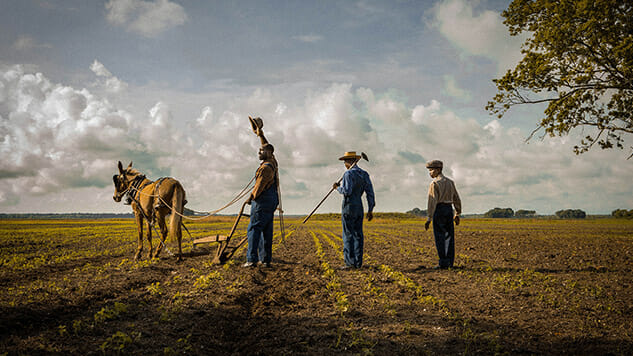Mudbound
(2017 New York Film Festival Review)

Mud clings to the boots, it cakes onto cloth and fabric—and sometimes it can even feel like it globs onto your spirit. Mud is hard to wash completely away: There are still granular specks after you shower, the grains seemingly forever attached, becoming a part of your body, of you and your history with it. In her new film Mudbound, Dee Rees makes the assertion that trauma is like mud in the way it sticks to us like glue, how it binds us together, almost a shared cultural language. Framed like a family epic examining the dynamics between half a dozen characters, Rees’s film slowly sprawls, settled in mud.
The film really does sprawl, taking its sweet time to map out the lives of the white McAllan family—once somewhat well-to-do until patriarch Henry (Jason Clarke) is hoodwinked into buying a rural Mississippi shack in lieu of a middle class home—and the African American Jackson family, who only want to plant their own lives in the South. Both families have members returning from World War II: Henry’s brother, Jamie (Garrett Hedlund), and the son of Jackson heads Hap (Rob Morgan) and Florence (Mary J. Blige), Ronsel (Jason MItchell). Jamie struggles to reconnect with his brother, is estranged from his father, Pappy (Jonathan Banks), and the dynamic he shares with Henry’s wife, Laura (Carey Mulligan), tiptoes around increasingly treacherous territory. The only person left with whom Jamie can connect, who has any idea of what he went through in war, is Ronsel.
Mudbound often feels curious in its scope, diving into the worlds of two families (or one world that’s shared by two families), though the internal monologues of these family members don’t necessarily tell us things we don’t already know or couldn’t easily figure out. Mudbound’s is a large and cumbersome story not because of the complicated dynamics it presents, but because of the way they’re presented, with a lot of opportunity to explore the complexity between characters, but little of those opportunities are constructively used, perhaps because there is too much material on hand. It’s strange, because the adaptation, by Rees and Virgil Williams and based on the novel by Hillary Jordan, ostensibly gives us enough space with everyone to get a sense of their personality (if, primarily, because the running time clocks in at two hours and 14 minutes): We spend a lot of screen time with these characters, in other words. Still, in spite of the palpable regret, loss and frustration that characterize the characters’ lives, an odd texturelessness takes hold of how they act. Rees focuses on the quotidian aspects of these people, but the aspects rarely register as meaningfully as they should, at least enough to make Jamie and Ronsel’s interactions stand out for more reason than that their friendship is “unlikely.”
-

-

-

-

-

-

-

-

-

-

-

-

-

-

-

-

-

-

-

-

-

-

-

-

-

-

-

-

-

-

-

-

-

-

-

-

-

-

-

-








































